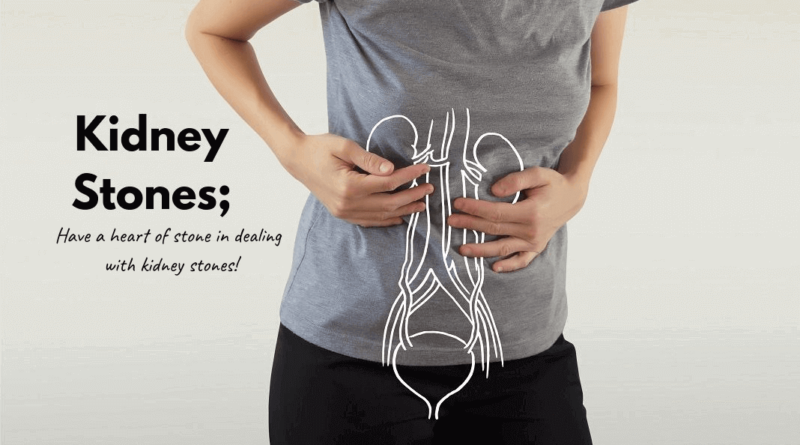Effective Natural Remedies to Get Rid of Kidney Stones
Kidney Stones are a common health issue that afflicts a large number of people.
As a matter of fact, studies estimate that about 12% of males and 5% of females residing in the US will develop a kidney stone(1) at some point in their life. Further, nearly 12% of the entire world’s population(2) will develop a kidney stone at least once. That’s a sizeable population that is bound to increase further!
| The first recorded incident of urinary stone dates back to 4000 BC!(3) |
However, despite its common occurrence, the pain associated with kidney stones is too excruciating to define. Needless to say, several kidney stone patients have left no stone unturned (pun intended) to find out how to get rid of kidney stones in a painless manner. Or they have at least tried to find ways to minimize the pain associated with it.
If you are on the lookout for natural remedies for kidney stones that do not require surgery, then you have come to the right place!
Table of Contents
What Are Kidney Stones?
The kidneys play the role of flushing out toxins from your system. They detoxify your blood and get rid of any liquid waste present in your body. During this process, the solid waste materials, such as salts and minerals, form a solid, crystalline structure, which is the Kidney Stones, otherwise known as nephrolithiasis or renal stones.
If you are wondering what does a kidney stone look like, then it is known that the size, appearance, and composition of kidney stones are variable. Some kidney stones could be as small as a full-stop while others could measure in inches! Small kidney stones are usually not a problem as they pass through the urine on their own. However, passing kidney stones not only cause discomfort but could also block the urinary tract while being removed from the body.
Did You Know!
|
While a kidney stone normally forms in the kidneys, they can also develop in other sections of your urinary tract, such as ureter, bladder, and urethra. Further, a kidney stone may develop in any part of the urinary tract and move to another portion.
Signs and Symptoms of Kidney Stones
The initial development of kidney stones is asymptomatic. The signs of kidney stones only peek through once the stone has developed and passes along the urinary tract. Some of the most common symptoms that indicate that you may have developed a kidney stone are:
1. Pain in the Stomach, Back, or Sides (Flanks)
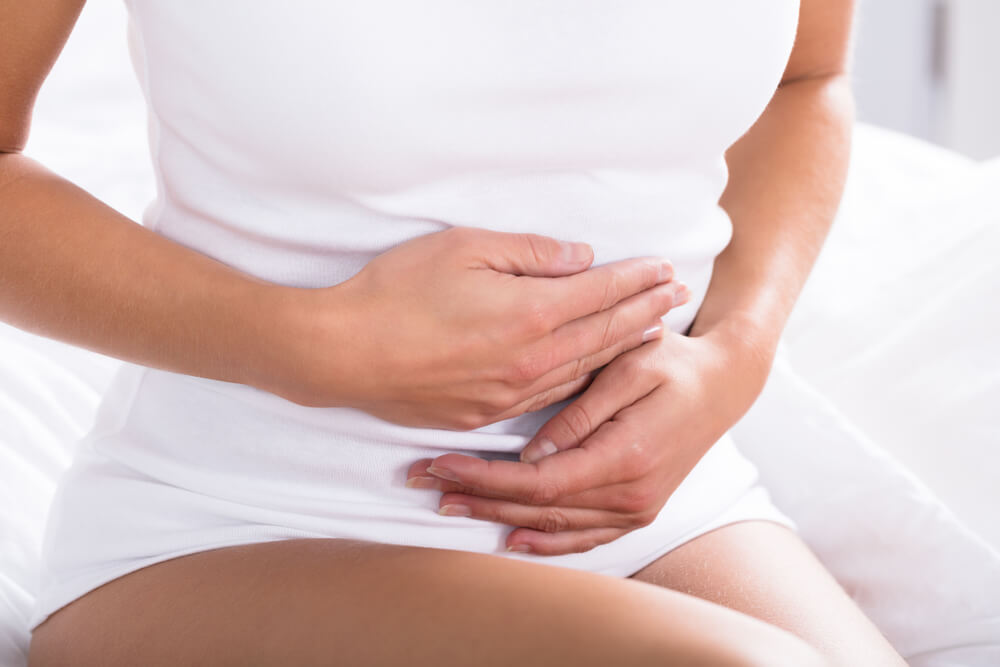
Kidney stone pain is also known as renal or stone colic. According to those who have experienced it, the pain is comparable to being stabbed or giving birth! It has been statistically determined that every year, kidney stone pain warrants nearly 1 million visits to the hospital’s emergency room(4).
Normally, the pain is triggered by the descent of the stone from the kidney into the narrow ureter. The pressure exerted by the stone activates the nerve fibres that are responsible for transmitting the pain signals to the brain. This pain normally radiates from the region below your ribs, that is, the side and extends up to the groin or the stomach. It worsens with the contractions of the ureter as it tries to flush out the stone.
2. Pain or Burning Sensation During Urination
The journey of the kidney stone in the bladder and ureter junction is marked by pain and burning sensation during urination. This condition is technically known as dysuria. At this stage, the pain may be sharp and leave a burning sensation. Quite often, individuals mistake this as a urinary tract infection.
| Patients suffering from acute kidney stones may also develop conditions like urinary tract infection! |
3. Frequent Urination
If you feel that Mother Nature has kept you on speed dial, then it may be possible that the stone is present in your lower urinary tract. The constant urge of peeing may be mistaken for urinary tract infection. Either way constant peeing is not a good sign and needs to be checked.
4. Blood in Urine
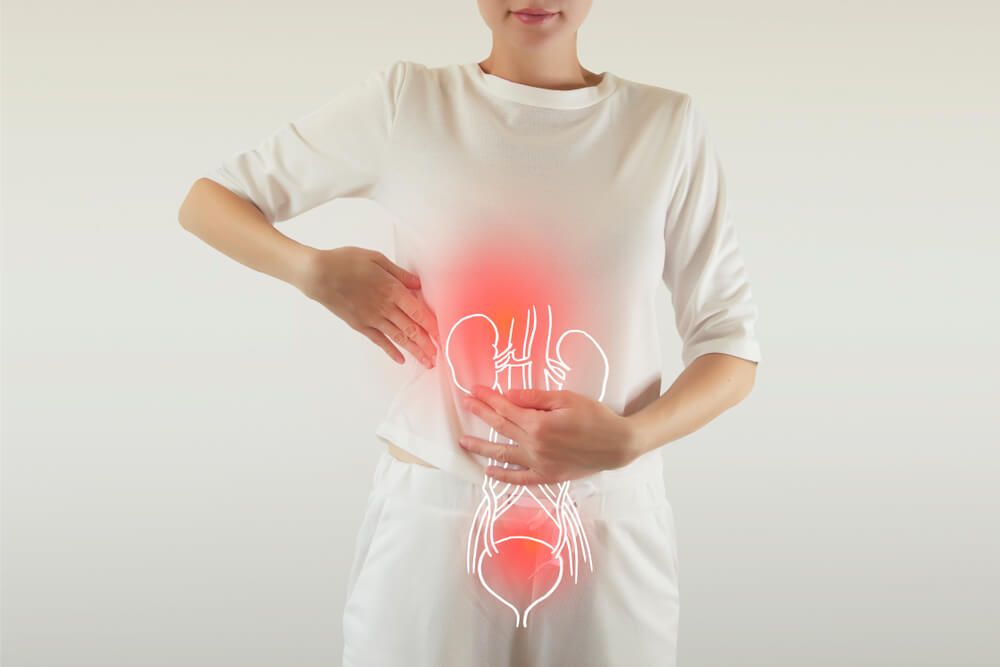
Blood in the urine(5) is one of the common symptoms of kidney stone formation. This condition is known as hematuria. The color of the blood could be brown, red, or pink. Sometimes, the traces of blood may be too microscopic to be detected by the naked eye. At this stage, the condition is called microscopic hematuria. Pathological laboratories test urine to locate blood.
5. Cloudy or Stinky Urine
Healthy urine is clear and does not possess a strong odor. If you are passing urine that is cloudy or smells foul, you may be suffering from a kidney or urinary tract-related issue. Pyuria is a condition where an individual passes pus in the urine, which makes the urine appear cloudy. Further, the overpowering odor is due to the bacteria present in the urinary tract.
6. Decrease or Stoppage in Urine Flow
Large kidney stones have the capacity of blocking out the ureter. As a result, the amount of urine decreases drastically. Thus, even if you go often, you will notice that the flow of urine will be significantly low. However, the stoppage of urine flow is a grave medical emergency.
7. Nausea and Vomiting
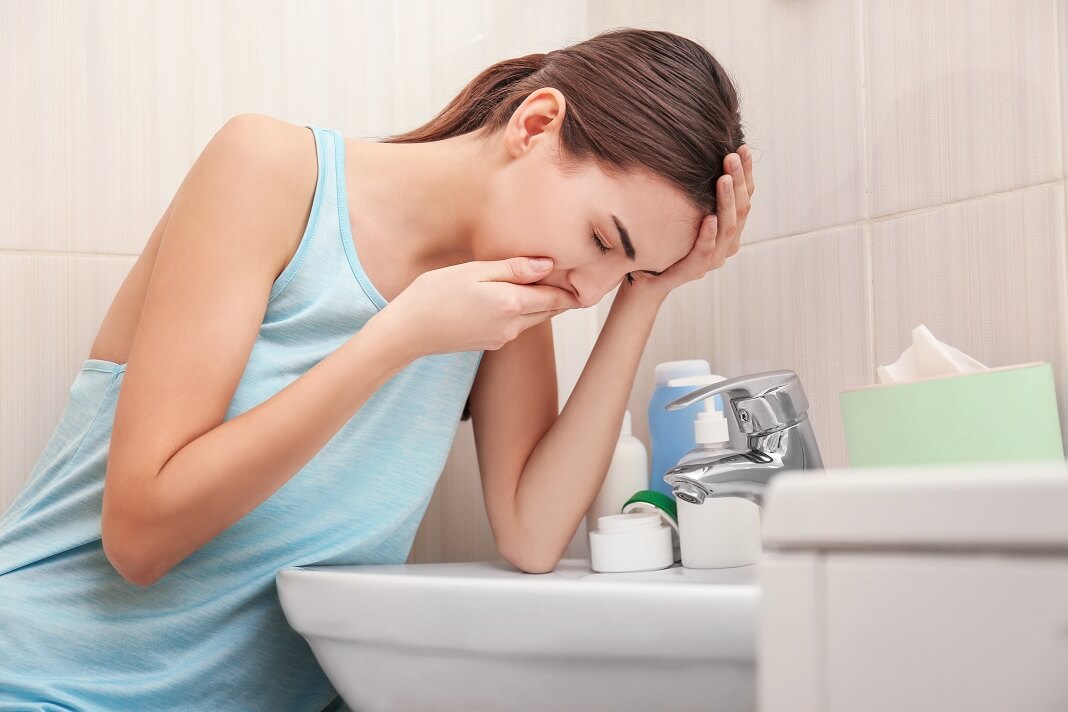
Nausea and vomiting are fairly common(6) amongst those suffering from kidney stones. It happens due to the shared nerve connection(7) present between the GI tract and kidneys. As a result, kidney stones can trigger the nerves of the GI tract that may upset your stomach. Further, nausea and vomiting may also be your body’s coping mechanism(8) to the pain.
Also Read: 5 Effective Yoga Postures to Treat Nausea
8. Fever and Chills
Fever and chills could indicate an infection in your kidneys or the urinary tract. In the case of fevers associated with kidney stones, the temperature can run as high as 100.4 degrees or more. Fevers, chills, and pain call for immediate medical intervention.
Vulnerable Groups
While kidney stones are prevalent amongst men and women, a greater percentage of men develop kidney stones.
| Renowned Italian Renaissance painter, Michelangelo, suffered from recurring kidney stones(9)! |
Unfortunately, those who have experienced kidney stones are at risk of developing it again(10)! In fact, studies suggest(11) that you not only have a 50% chance of developing a kidney stone again but also that it will re-occur within five to ten years(12)!
In addition to those who have already developed kidney stones, the following are the risk factors for developing kidney stones:
- Severe dehydration.
- Urinary tract infections.
- A diet rich in protein, glucose, and salt.
- Hyperparathyroidism, renal tubular acidosis, and other similar conditions.
- Obesity.
- Inflammatory bowel disease that increases the absorption of calcium.
- Gastric bypass surgery.
- Medications, such as triamterene diuretics, topiramate, calcium-based antacids, and anti-seizure drugs.
- Family history of stones.
Types of Kidney Stones
There are four main types of kidney stones, amongst which calcium oxalate is the commonest of all. In fact, 80% of all kidney stones(13) are composed of calcium oxalate!
The different types of kidney stones include:
1. Calcium
Calcium-based kidney stones are very common. While the primary element in this type of kidney stone is calcium oxalate, it could also contain calcium phosphate or maleate. Calcium phosphate kidney stones form as a result of an underlying metabolic disorder.
Consuming a diet rich in oxalate can increase the chances of developing this kind of kidney stone. Foods, like potato chips, chocolate, beets, spinach, peanuts, etc., are rich in oxalate and hence must be avoided. Even though the stone is composed of calcium, eating a calcium-rich diet may decrease the chances of developing such kidney stones.
2. Uric Acid
Kidney stones composed of uric acid is more common in males than females. It may also occur in individuals undergoing chemotherapy or suffering from gout. The stone develops due to the high acidity of urine. A purine-rich diet is the main culprit behind increasing the body’s uric acid levels. Purine is often available in animal-based proteins, such as meats, fish, and shellfish.
3. Struvite
Struvite is a common occurrence amongst women who are suffering from urinary tract infection. These stones are normally quite large and can even block the flow of urine. They result from kidney infections, and treating the infection will retard the development of struvite stone.
4. Cystine
Those who have wondered “Are kidney stones hereditary?” would be disheartened to know that while cystine stones are rare, they are genetic in nature. It can occur in both men and women who suffer from hereditary cystinuria. Through this type of kidney stone, a naturally occurring acid called cystine that seeps through the kidneys into the urine.
Other Health Risks Associated with Kidney Stones
Kidney Stones are not an isolated health issue. In fact, they may trigger other health issues(14) like:
- Chronic kidney diseases.
- End-stage renal failure.
- Cardiovascular diseases.
- Diabetes.
- Hypertension.
How to Get Rid of Kidney Stones
In this section, we will deal with how to remove kidney stones through natural, non-surgical methods.
- Home Remedies
- Foods and Beverages
- Essential Oils
- Herbs
- Supplements
CURE 1: Home Remedies For Kidney Stones
Let us look at how to treat kidney stones through home remedies:
1. Drink Water

Staying hydrated is vital to aid the passing of kidney stones. However, drinking plenty of fluids is also the answer to how to prevent kidney stones. Amongst all the liquids, water is most potent(15) against kidney stones.
Why is it effective?
Water flushes out all the bodily toxins while also moving the grit or stone through your urinary tract. Even if you try out other home remedies for kidney stones, you must follow it up by drinking enough water. Drinking water allows the active compounds to pass through your system and be more effective. If you are passing deep yellow urine, then you may be dehydrated and at risk of developing kidney stones.
Quantity and frequency of usage
Aim for drinking twelve glasses of water daily in place of eight and pay close attention to the colour of your urine.
2. Apple Cider Vinegar
Apple Cider Vinegar is a potent cure for kidney stones. Regular ingestion of apple cider vinegar is also a great preventive measure for kidney stone formation. If you are wondering how to avoid kidney stones, then Apple Cider Vinegar is your answer.
Why is it effective?
Apple Cider Vinegar contains acetic acid that can help soften and dissolve(16) kidney stones.
How to use it?
Make a concoction of water with two tablespoons of apple cider vinegar. Consuming this drink before meals can also help alleviate the symptoms.
Quantity and frequency of usage
Drink the mixture once or twice a week to keep kidney stones at bay.
NOTE: If you are on medication for diabetes or blood pressure regulation, then avoid consuming apple cider vinegar.
3. Baking Soda
Baking soda is much more than an ingredient to bake goodies; it has been widely used for other purposes, such as cosmetic applications. Due to its alkaline nature, it can be rather effective in dealing with kidney stones.
Why is it effective?
Consuming baking soda helps as the alkalinity of the baking soda decreases the acidic content of the urine. As discussed earlier, acidic urine could lead to kidney stone formation. Once the acidity of the urine decreases, it will be easier to pass the kidney stones.
How to use it?
Baking soda for treating kidney stones relates to mixing a tablespoon of baking soda in 10 ounces of lukewarm water and then drinking the mixture immediately.
Quantity and frequency of usage
Repeat the above-mentioned exercise thrice in a day.
4. Heating Pads

Heat application has always been a tried and tested method to deal with pain. As such, it comes as no surprise that heating pads feature on this list of relieving kidney pain.
Why is it effective?
Applying heat to the region around the kidneys can help in relieving the pain and inflammation caused due to kidney stones. Heating pads will help your muscles relax and have an antispasmodic effect. As a result, the relaxed muscles will offer lower resistance to the passage of kidney stones.
Quantity and frequency of usage
You may apply a heating pad on the affected region for nearly 15 to 20 minutes about two to three times a day until the pain subsides completely.
5. Massages
Massage therapy has emerged as an alternative cure(17) to relieve kidney stones and its resultant discomfort. A professional massage therapist can gently massage the affected areas to soothe the pain. In fact, certain massage techniques help in guiding the stone through the urinary tract, which accelerates its removal while decreasing the pain.
Why is it effective?
Massaging improves the blood circulation to the affected area. As a result, it transports oxygen and detoxifies your system. Therefore, massaging around your kidneys can not only help with relieving kidney pain but also prevent it.
Quantity and frequency of usage
Visit a massage therapist after passing the kidney stone and follow the techniques as prescribed by them.
CURE 2: Foods and Beverages
As the kidneys are responsible for detoxifying your blood and cleansing your body, it is needless to say that what you eat or drink affects your kidney’s health. As a result, some food and beverage items can help (or even aggravate) in dealing with kidney stones.
1. Cranberry Juice
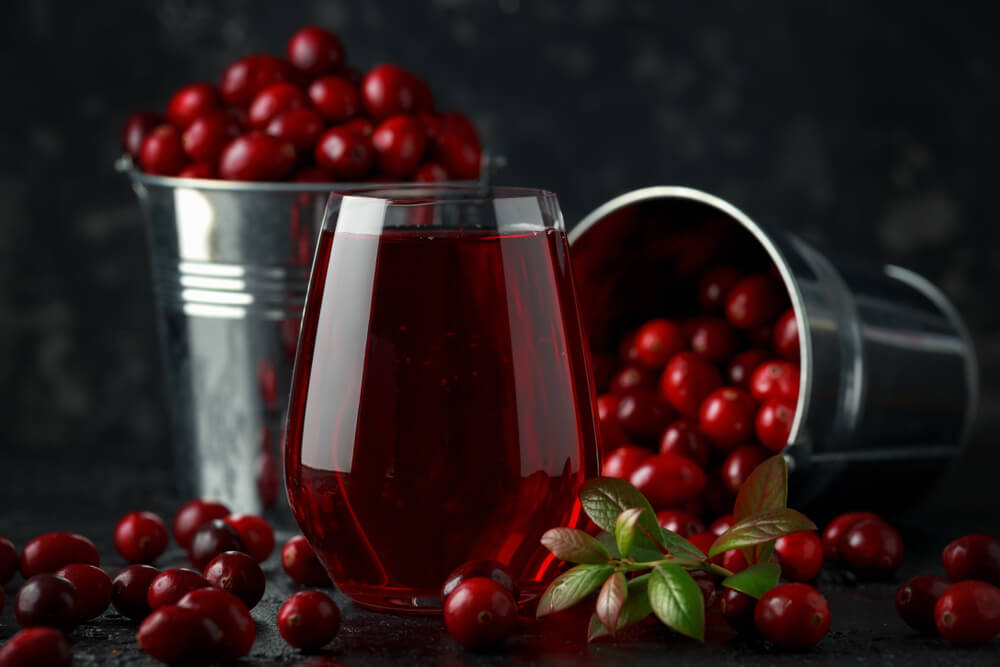
Unsweetened cranberry juice is the undefeated cure for kidney stones. It is also highly potent against urinary tract infections. As such, if your condition comes along with UTI, you can kill two birds with this single stone. However, consult your physician first before resorting to this natural cure as studies have indicated that cranberry juice may ironically encourage(18) the formation of calcium oxalate stones!
Why is it effective?
Cranberry juice has strong diuretic properties that are vital for treating renal calculi(19). Diuretics increase the frequency of urination, which maintains the health of your kidneys. As toxins and metabolic wastes are regularly flushed out from the system, the possibility of kidney stone formation reduces.
Quantity and frequency of usage
Consume a glass of unsweetened cranberry juice once or twice a day to enjoy the health benefits associated with it.
2. Lemonade
A refreshing drink of lemonade can do much more than cool your system. It can actually help dissolve your kidney stone! With regular consumption of lemonade, you will notice significant relief from kidney stone-related problems.
Why is it effective?
Lemon juice for kidney stones treatment is highly effective as it contains a large concentration of citrates(20) that help in dissolving kidney stones. Further, due to the diuretic and antioxidative properties of lemon juice purifies the system and detoxifies your body. The fact that it also possesses anti-inflammatory properties that help in alleviating the pain associated with kidney stones(21) is another plus in favour of lemon juice.
How to use it?
Stir in the juice of half a lemon in a glass of warm water; you may flavour it with honey.
Quantity and frequency of usage
Drink lemonade for treating kidney stones twice a day, early in the morning on an empty stomach and at night before your meal.
3. Olive Oil
In addition to the lemon juice, you can also use olive oil for passing kidney stones. Remember the last time when you had to rub oil on your finger to take off the tight ring? The same could be applied here!
Why is it effective?
The greasiness offered by olive oil(22) allows the kidney stone to pass easily through the urethra. Lemon juice and olive oil will reduce the kidney stone size and eject it from your system.
How to use it?
Mix equal parts lemon juice and olive oil in some lukewarm water and consume it immediately.
Quantity and frequency of usage
Drink the concoction two or three times repeatedly until you pass the kidney stone.
4. Wheatgrass Juice
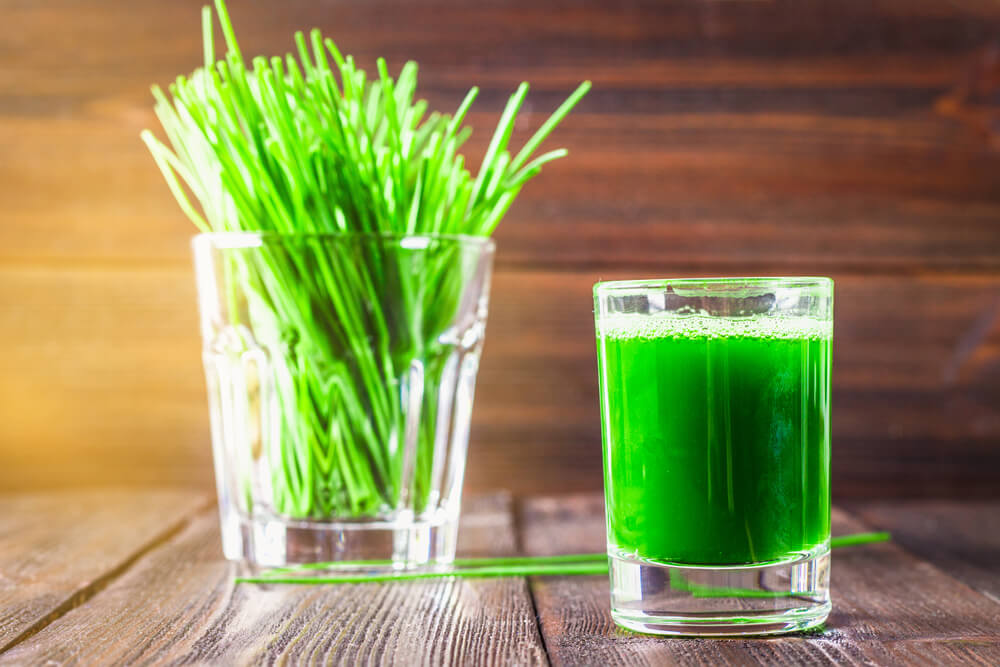
Wheatgrass juice has recently emerged as a superfood that can take on a number of health issues. Thus, having a cup of wheatgrass juice on a daily basis will drastically improve your health and could possibly fix your kidney stone troubles.
Why is it effective?
Wheatgrass contains a high level of antioxidants(23). As such, it can reverse the damage caused to the kidney by free radicals. Further, its diuretic properties allow the passage of kidney stones. Wheatgrass supplements are also available at supermarkets or online stores.
Interestingly, wheatgrass also contains anti-inflammatory properties. This discovery came to light through a study(24) conducted on patients suffering from ulcerative colitis. The chlorophyll pigments present in wheatgrass juice also contributes to alleviating pain.
How to use it?
Harvest fresh wheatgrass by snipping off eight inches of wheatgrass about half an inch above the ground. Wash and roughly chop the wheatgrass. Blend half a cup of wheatgrass with two to three cups of water to make fresh wheatgrass juice. In case you are making use of wheatgrass supplement, follow the instructions given in the package.
Quantity and frequency of usage
Have one glass of wheatgrass juice daily. For greater efficiency, consume it on an empty stomach or an hour before your meals.
5. Dandelion Tea
Tea prepared from the dandelion root is highly recommended for those suffering from liver issues and diabetes. However, it could also help in providing relief from the pains arising from kidney stones.
Why is it effective?
Dandelion root contains anti-inflammatory properties that not only subside kidney stone-related pain but also reduce swelling and inflammation. Further, the potassium content of dandelion root helps in dissolving the kidney stones. As dandelion is a natural diuretic(25), it is recommended to drink two to three cups of dandelion tea in a day.
How to use it?
Prepare dandelion tea by steeping a teaspoon of dandelion root in a cup of boiling water. Drink warm. Follow it up by consuming a cup of filtered water.
Quantity and frequency of usage
Drink a cup of dandelion tea daily to extract its benefits.
NOTE: Practice caution as the root of dandelion interacts with medicines prescribed for diabetes and blood pressure. Further, you might want to skip this cure if you suffer from gallbladder related health issues.
6. Nettle Leaf Tea
Tea is an effective way to treat kidney stones, Nettle Leaf tree is potent in providing relief from kidney stone pain. The leaves of Urtica dioica, also known as stinging nettle, are not the only part of the plant that has medicinal value. The root of the plant is also well-known for providing a wealth of nutrients.
Why is it effective?
Dried nettle leaf tea can help for treating kidney stones. Nettle leaf heavily promotes renal health(26) as it increases the frequency of urination and helps in maintaining the electrolyte balance. As the rate of urination increases, the process of passing kidney stone gets easier.
How to use it?
Brew two tablespoons of dried nettle leave in a cup of hot water. Allow it to steep for about ten minutes. Strain and drink the tea.
Quantity and frequency of usage
Drinking two to three cups of Nettle Leaf tea daily can help flush out kidney stones and prevent the formation of any new stones.
7. Kidney Beans
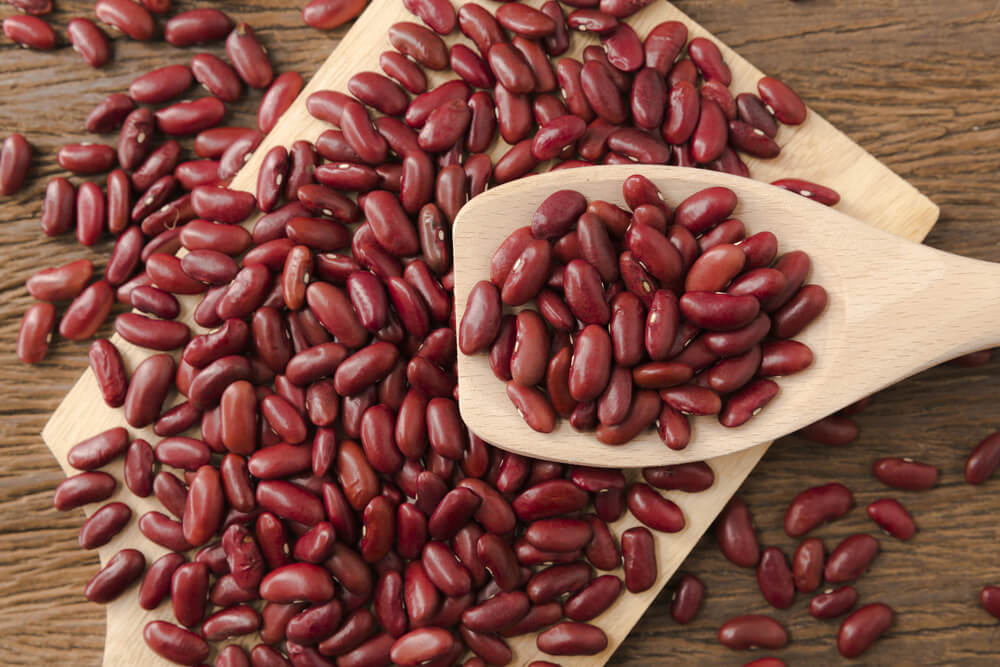
An old, wise saying states that consuming organ-shaped foods can promote the health of that organ. Hence, it is no surprise that the kidney-shaped kidney beans are highly effective(27) in getting rid of kidney stones.
Why is it effective?
Kidney beans contain a high concentration of magnesium and Vitamin B, a mineral and vitamin that helps in relieving kidney stones and their symptoms. Further, these beans are a rich source of dietary fibers, which help with the maintenance and upkeep of your kidneys and urinary tract.
How to use it?
Soak a cup of kidney stones daily and boil it before consumption. Opt for fresh kidney beans rather than the canned variant as canned kidney beans contain a large quantity of sodium, which is unhealthy for the kidneys.
If for some reason you do not wish to eat kidney beans, you can drink the residual broth left behind after boiling the kidney beans. Strain out the liquid and drink it.
Quantity and frequency of usage
Consume a small cup of kidney stones daily. If you wish to consume kidney bean broth, drink a cup two to three times daily.
CURE 3: Essential Oils for Kidney Stones
Essential oils primarily help with relieving the pain linked to the passage or movement of kidney stones. While you can also inhale the health benefits of essential oils, applying it topically increases the efficacy of the essential oil.
1. Lemongrass Oil
Lemongrass is a common Indian herb that is used to flavor tea. Other South-East Asian countries use lemongrass for their culinary prowess. The oil extracted from lemongrass is rich in the antioxidant(28), anti-inflammatory, antifungal(29), and antibacterial properties present in lemongrass.
Why is it effective?
Lemongrass possesses anti-inflammatory qualities(30) that can soothe aching or sore muscles. In addition to relieving the pain, lemongrass oil also helps in boosting the blood circulation to the kidney and the areas surrounding it.
How to use it?
Mix about 3 ml of lemongrass essential oil with 100 ml of carrier oil (such as almond oil) and apply it over the kidney region. Massage it lightly in circular motions to mitigate the kidney stone pain.
Quantity and frequency of usage
Apply the oil and massage it into your skin two times a day.
2. Helichrysum Oil
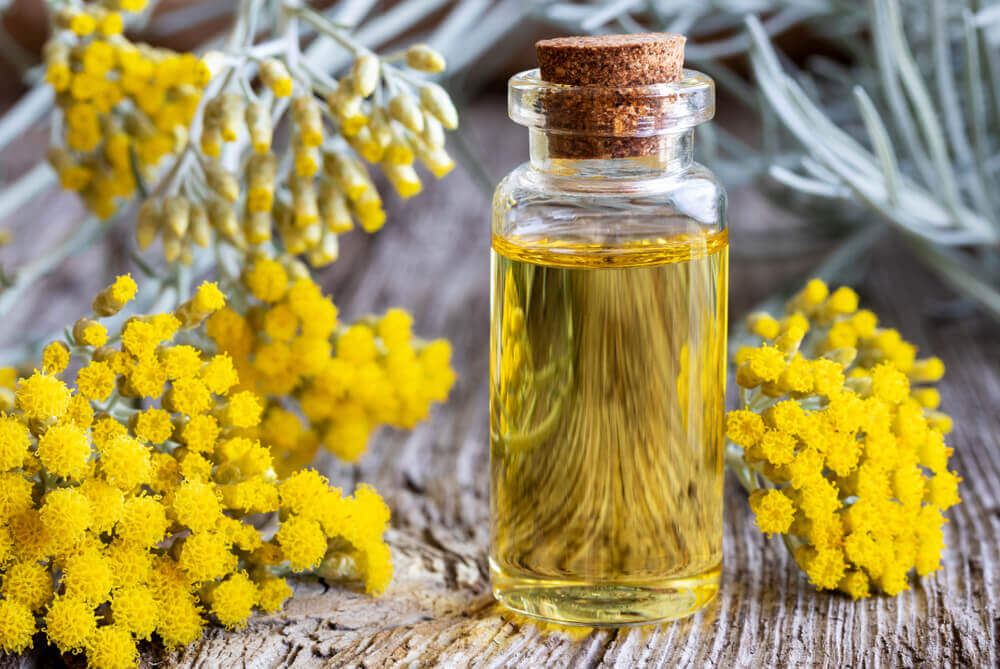
Helichrysum is found in the Mediterranean belt and Southern Europe. The essential oil is extracted from the leaves and stem of the plant while the dried flowers also containing medicinal properties. The flowers bear a strong curry-like fragrance, which is why this plant is sometimes also called curry plant.
Why is it effective?
The essential oil extract of Helichrysum possesses antioxidant, anti-inflammatory(31), and antispasmodic(32) properties that offer relief from the discomfort caused by kidney stones. Helichrysum oil is also a mild diuretic that flushes out all the waste and toxins accumulated in the kidneys. Further, it may prevent the formation of kidney stones in the future.
How to use it?
Combine 3 mL of Helichrysum essential oil with 100 ml of carrier oil, such as olive or coconut oil. Apply this mixture on your lower abdomen and your sides to alleviate the pain arising out of kidney stones.
Quantity and frequency of usage
Apply the essential oil twice a day to lessen the pain.
3. Sweet Orange Oil
Extracted from the peels of oranges, Sweet Orange oil is extremely popular amongst those who practice aromatherapy. Interestingly, this oil also possesses aphrodisiac qualities while also being potent against depression.
Why is it effective?
Sweet orange oil is a citrus essential oil that has antispasmodic qualities. As a result, it eases the pain caused by the spasms occurring in the urinary tract as the kidney stone passes through it. Sweet orange oil also acts as a mild diuretic, which promotes the movement of water through the body and as a result flushes out metabolic wastes and kidney stones.
How to use it?
Add a drop of sweet orange oil to 30 ml of carrier oil (such as coconut or olive oil). Gently massage it over the kidney area.
Quantity and frequency of usage
Apply the oil twice a day for the essential oils to take effect.
4. Grapefruit Oil
Cold pressing grapefruit peels yield grapefruit essential oil. Grapefruit oil bears an orange hue and possesses a typical citrus smell. What may come as a surprise is that this essential oil possesses the quality to suppress appetite.
Why is it effective?
Grapefruit (Scientifically known as citrus paradisi) essential oil contains natural antioxidant and diuretic properties that can help with kidney stones. It flushes out the toxins from your body and keeps your kidneys healthy. Further, the anti-inflammatory properties(33) can alleviate the pain caused by kidney stones.
How to use it?
In a bowl, mix three drops of grapefruit oil to a tablespoon of salt and add hot water to it. Soak a cloth, wring out the excess water, and place it over your kidney.
Quantity and frequency of usage
Apply the grapefruit oil hot compress for 15 minutes at least once a day.
CURE 4: Herbs for Kidney Stones
Certain herbs contain diuretic properties that help in cleansing out the kidneys and consequently improve the organ’s health.
1. Parsley

Parsley is flowering plant local to the central Mediterranean region. It is much more than as a herb used for garnishing your dishes.
Why is it effective?
Parsley is a natural diuretic(34) that increases the frequency of urination. Researchers have also observed that parsley may also play a role in preventing kidney stones(35). In a study(36), scientists tested parsley on rats and noticed an increase in urine volume, a decrease in urinary calcium excretion, and an increase in the acidity of urine. However, this discovery is limited to rats and has not been tested on humans.
How to use it?
To incorporate parsley in your diet, you can blend together an ounce of parsley with equal parts of cilantro and a stick of celery. Add a few drops of lemon juice to this detox juice and drink it immediately.
Quantity and frequency of usage
Have two glasses of parsley juice, one early in the morning on an empty and have the second an hour before you have dinner.
2. Basil
Basil is yet another herb that promotes kidney health(37). It is popularly used in teas, supplements, and cooking too. As it possesses anti-inflammatory properties, it can ease pain or discomfort caused by kidney stones.
Why is it effective?
Due to the presence of acetic acid(38), Basil possesses the qualities to dissolve kidney stones naturally. Further, it has a stimulating effect on the body that counters nausea and vomiting, which is prevalent in cases of kidney infection.
How to use it?
A basil-infused tea can be a great way to include basil in your diet. Allow five to six leaves of basil to steep in a cup of hot water for about ten to twelve minutes. Strain out the liquid and consume it while warm. You can even add some honey for added flavours.
You can also make a healthy basil smoothie to include this in your diet.
Quantity and frequency of usage
Drink three to four cups of Basil tea daily to enjoy its benefits.
3. Garlic
The medicinal properties of garlic have been put to use for centuries. It can benefit you in various ways ranging from protecting the heart from fighting cancer! It reduces high blood pressure, which can adversely affect an individual with kidney stones.
Why is it effective?
Garlic is rich in antioxidant compounds that can protect the body from the damaging effects of free radicals. The diuretic properties(39) remove toxins and other metabolic wastes from the kidneys. If you are suffering from a kidney infection, then consuming garlic can bring down the infection. This healing property is due to allicin(40), a compound that contains antimicrobial properties.
How to use it?
Puree four cloves of garlic into a fine paste. Mix one tablespoon of yoghurt with the garlic paste. Apply it topically on your back and sides where kidney pain is prominent. Leave it on for about ten to twelve minutes and then rinse it off with warm water.
Quantity and frequency of usage
Apply this ointment one to two times a day.
4. Horsetail
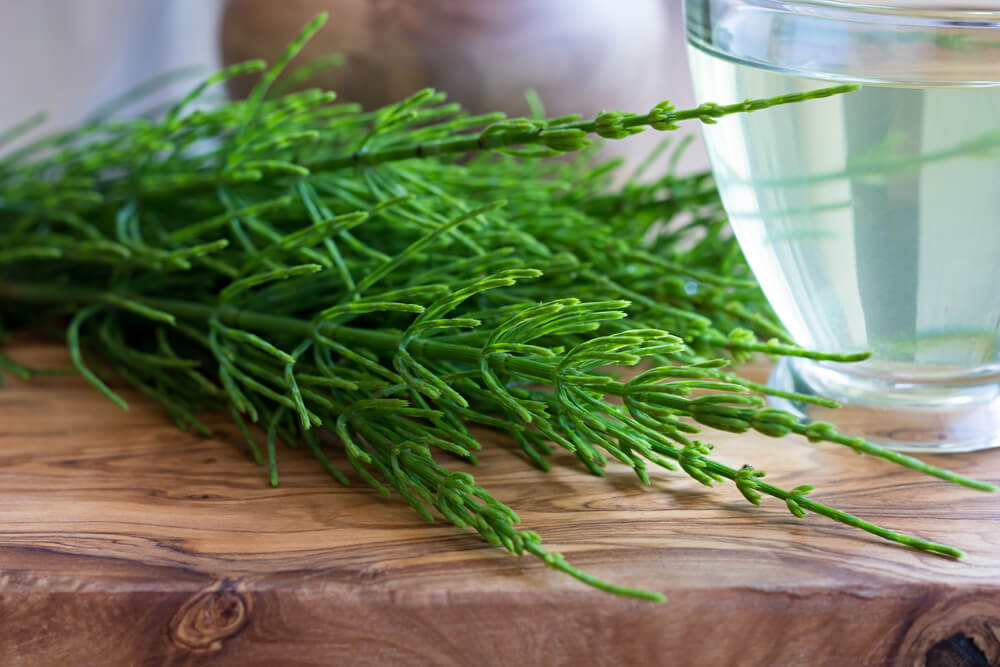
Horsetail is the common name for Equisetum plants. It is also known by the name of puzzle grass. Interestingly, it is the only surviving plant from its genus!
Why is it effective?
Horsetail herb can increase your urine output by nearly 30 per cent! It is possible due to the essential minerals like potassium, magnesium, and various phytocompounds, ascorbic acid, equisetine, which have diuretic properties(41). It also contains anti-inflammatory properties that reduce pain and swelling caused in kidneys.
How to use it?
Simply steep two to three teaspoons of horsetail in hot water for about five to ten minutes and strain and drink the mixture immediately.
Quantity and frequency of usage
Having two to three cups of this Horsetail tea daily can improve your renal health.
NOTE: It is advisable to purchase genuine horsetail from a reliable brand or shop. Further, you should not use horsetail for more than six weeks at a stretch as it could decrease your Vitamin B levels and may even cause seizures.
CURE 5: Supplements for Kidney Stones
As you may have read, those who have developed kidney stones once are susceptible to forming them again. As such, a preventive cure is extremely vital, and thus, you may make use of supplements for preventing kidney stones.
1. Vitamin Supplements
While you may be consuming a balanced diet, the body may be unable to retain or extract the necessary vitamins and minerals. One can take supplements containing vitamins and minerals for kidney stones prevention.
Why is it effective?
Vitamin B6(42) decreases the oxalate production by the body and as such, prevents kidney stone formation.
How to use it?
You can consume Vitamin B Complex tablets without a doctor’s recommendation. Alternatively, you can ask your physician to prescribe you a complete Vitamin course. Purchase it from a local pharmacy or online.
Quantity and frequency of usage
Follow the dosage as instructed by the doctor. Consume the supplement on an empty stomach just after waking up.
2. Mineral Supplements
Minerals, such as calcium and magnesium are perfect for kidney stones treatment.
Why is it effective?
Calcium deficiency leads to excessive oxalate production, which could result in the formation of kidney stone. Further, magnesium binds with oxalates present in the digestive tract, which in turn inhibits the formation of kidney stones. Both these minerals are highly potent in its citrate form as citrate alkalinizes the urine and brings down its acidity.
How to use it?
Consult your physician for a magnesium-based mineral supplement. You can purchase them from your local chemist or online.
Quantity and frequency of usage
Magnesium supplements may interfere with your regular kidney stone medication. As such, strictly follow the dosage administered by the doctor.
3. Fish Oil

Fish oil is obtained from the tissues of oily fish, like tuna, herring, anchovies, and mackerel. Individuals who do not consume fatty fish source the necessary omega-3 fatty acids from fish oil. As such, it is a highly common supplement.
Why is it effective?
Fish oil is a rich source of Omega 3 fatty acids and can be highly effective against calcium oxalate type kidney stones. Further, eicosapentaenoic acid and docosahexaenoic acid(43) (EPA and DHA respectively) are compounds present in fish oil that lowers the calcium concentration and urine and thereby prevent kidney stone formation.
How to use it?
Fish oil supplements that can be consumed orally are easily available online or at shops.
Quantity and frequency of usage
Consume 6 grams of fish oil tablets daily for up to 3 months after you have passed the kidney stone
Kidney stones can be a highly painful condition. Luckily, exercising and taking care of your diet can help in managing the pain and preventing kidney stones. If you suffer from kidney stones, it is important to stay hydrated and avoid high-sodium and high-sugar foods. Refrain from consuming alcoholic beverages.
A number of natural home remedies can help in dealing with the pain and discomfort associated with kidney stones. However, do make it a point to follow your regular medication and doctor’s advice while also testing out these home remedies. In case the pain is too intense and persistent, accompanied by blood in the urine and fever, then you must immediately consult a physician.
FAQs
Now that you know how to get rid of kidney stones, here are a few frequently asked questions to round up everything:
1. What causes kidney stones?
The reason behind kidney stone formation varies on the basis of the chemical composition of the stone. Following are some of the common causes of different types of kidney stones:
- Calcium stones are formed due to high oxalate levels in the diet and due to some metabolic disorders.
- Cystine stones are hereditary and develop in those who suffer from cystinuria.
- Struvite stones could develop due to urinary tract infection.
- Uric acid stones are common amongst individuals who consume a high-protein diet with low fluid intake.
2. What are the common symptoms of kidney stones?
The formation of kidney stone is asymptomatic. The symptoms only begin to reflect when the kidney stone starts to move. Some common symptoms and signs of kidney stones include:
- Abdominal pain.
- Pain (Renal colic) or cramping in the lower back and sides (flanks).
- Intense pain in the groin region.
- Pain or burning sensation during urination.
- Traces of blood in the urine.
- Cloudy urine or abnormal colouration.
- Nausea and vomiting.
- Fever and chills.
3. How long does it take for kidney stones to form?
Kidney stones could form within a span of a few days to even months. This duration required for stone formation primarily depends on your lifestyle, diet, and health conditions.
4. How long does it take for kidney stones to pass?
Depending on the size and location of your kidney stone, it may take a few days to a few weeks to pass kidney stones!
A significant number of kidney stone patients have reported(44) that taking a ride in Disney’s “Big Thunder” roller coaster has helped them pass kidney stones!
5. Can stress cause kidney stones?
Interestingly, studies(45) suggest that elevated stress could, in fact, lead to kidney stone formation and passage. Kidney stone formation due to stress is fairly common amongst females.
6. Are kidney stones genetic?
Unfortunately, yes. Kidney stones are hereditary in nature and as such, if any member of your family suffers from kidney stones, then you are at risk as well.

